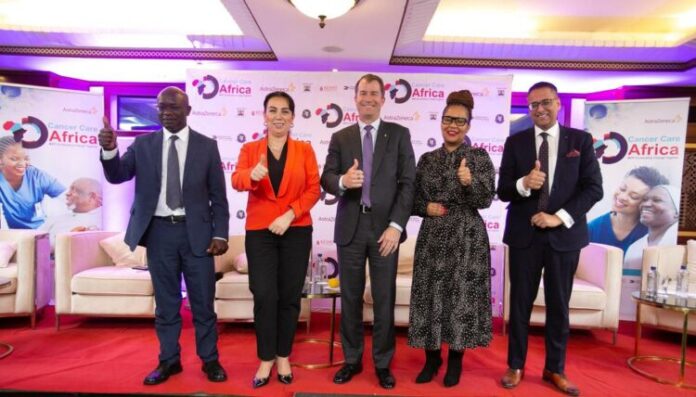AstraZeneca has joined forces with the Kenya Society of Haematology and Oncology (KESHO), Axios, the National Cancer Institute of Kenya (NCI), the Ministry of Health, and other partners to launch the first-ever Cancer Care Africa program in Kenya.
The programme aimed to improve access to and outcomes from cancer treatment in Kenya by equitably improving patient care pathways from diagnosis through treatment and beyond. Through a co-creation approach, the initiative will foster collaboration among the oncology community.
Hon. Nakhumicha S. Wafula EGH, Cabinet Secretary for Health, Kenya, Dr Elias Melly, CEO, National Cancer Institute of Kenya and Dave Fredrickson, Executive Vice-President, Oncology Business Unit, AstraZeneca, attended an event on Wednesday in Nairobi, Kenya, marking the launch of the program.

Cancer has become a major public health concern in Kenya and across Africa. Latest figures from the World Health Organization show there were 44,726 cancer cases and 29,317 cancer deaths in Kenya in 2022. This is set against a regional context that estimates 2.1 million new cases and 1.4 million deaths annually by 2040 across Africa.
Despite recent increases in resources invested in cancer, several critical barriers still hinder progress including a lack of disease awareness, limited diagnostic capabilities, an absence of structured screening programmes, and challenges in accessing treatment.
To tackle the barriers, the executive vice-president, Oncology Business Unit, AstraZeneca, Dave Fredrickson, said each country that AstraZeneca works with, develops initiatives across the company’s four pillars of action which are building capacity and capabilities; enhancing screening and diagnostics; empowering patients and enabling access to medicines.
“We are committed to supporting more than 100 oncology centres and providing training for more than 10,000 healthcare professionals to improve quality of care delivered to patients across the continent. We will enhance screening and diagnostics provision for one million people across lung, breast and prostate cancer, to improve patient outcomes and reduce health system burden through acting early approaches. We will also ensure we address the real needs of patients through engagement with local PAGs to support increased disease awareness and informed patient decision-making and enhance the availability of critical cancer medicines by introducing flexible models that can provide access to our innovative treatments,” Fredrickson further explained.
Speaking on the benefits of the Cancer Centre, Fredrickson said: “With an increasing number of patients being diagnosed with cancer in Kenya and across Africa in the coming decades, joint action to improve patient outcomes and safeguard health care systems for the future has never been more important. The Cancer Care Africa programme will support early detection, increase timely diagnosis, and improve access to treatment options for patients across Kenya.”
Ahead of the launch, Cancer Care Africa has already donated ultrasound biopsy machines to seven hospitals across Kenya to enhance early prostate cancer diagnosis, as well as donating the country’s first biomarker testing machine for epidermal growth factor receptor (EGFR) mutations to Aga Khan University Hospital.
Cabinet secretary for Health, Kenya, Hon. Nakhumicha S. Wafula EGH, said, “The launch of the Cancer Care Africa programme in Kenya is a significant step towards improving cancer care for all. This collaborative initiative has the potential to significantly improve access to diagnosis, treatment, and care, ultimately saving lives and improving the well-being of Kenyans impacted by this disease, as well as their families and communities.”
Launched in November 2002 at COP27 in Egypt, Cancer Care Africa is aiding countries across the continent to fight against cancer by advocating for policy changes to enhance screening and diagnostics, implementing health awareness and education programs to empower patients, as well as training physicians and healthcare workers and building their capacities, and striving to enable access to cancer medicines. With these pillars, Cancer Care Africa strives to improve outcomes for all individuals affected by the disease, irrespective of their demographic, geographic, or socio-economic status.




